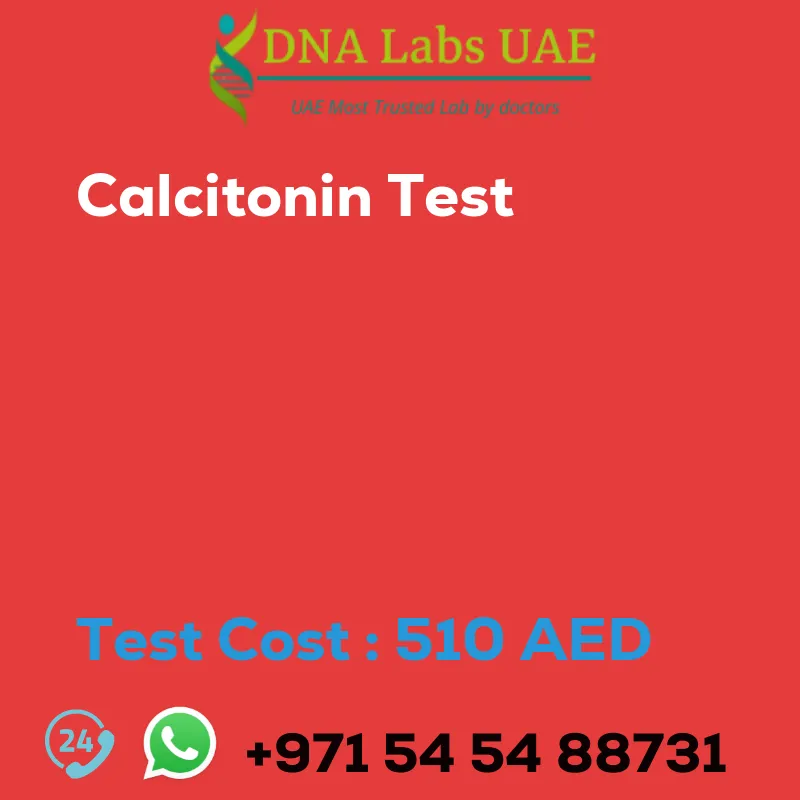CALCITONIN Test Price 510.0 AED In Dubai
Understanding the Calcitonin Test: A Comprehensive Guide
The calcitonin test is a crucial diagnostic tool used to measure the levels of calcitonin, a hormone produced by the thyroid gland, in the blood. This test is particularly important for individuals suspected of having medullary thyroid cancer or C-cell hyperplasia, as well as those with a family history of multiple endocrine neoplasia type 2 (MEN 2). In this article, we will delve into the details of the calcitonin test, its significance, and what it entails.
What is Calcitonin Test ?
Calcitonin is a hormone produced by the parafollicular cells (C-cells) of the thyroid gland. Its primary function is to regulate calcium levels in the blood by decreasing them. When blood calcium levels rise, the thyroid gland releases more calcitonin to counteract this increase. Conversely, when blood calcium levels drop, the thyroid gland reduces calcitonin production.
Purpose of the Calcitonin Test
The calcitonin test is primarily used to:
- Diagnose and Monitor C-Cell Hyperplasia and Medullary Thyroid Cancer: Elevated calcitonin levels are a strong indicator of these conditions.
- Screen High-Risk Individuals: Family members of those with MEN 2 are advised to undergo regular calcitonin tests to detect medullary thyroid cancer early.
- Monitor Treatment Effectiveness: The test helps in assessing whether treatment for medullary thyroid cancer is working and in detecting recurrence.
How is the Calcitonin Test Performed?
The calcitonin test involves a simple blood draw from a vein in the arm. Here’s a step-by-step guide:
- Preparation: While no special preparation is typically required, your healthcare provider may advise fasting for several hours before the test.
- Blood Collection: A healthcare professional will use a small needle to collect a blood sample from a vein in your arm. This process usually takes less than five minutes.
- Stimulation Test: In some cases, a calcitonin stimulation test may be ordered. This involves taking an initial blood sample, followed by an injection of a substance that stimulates calcitonin production. Additional blood samples are then collected over the next few minutes.
Interpreting Test Results
- Normal Levels: A normal calcitonin level is generally less than 10 pg/mL. However, normal ranges may vary between laboratories.
- Elevated Levels: Higher-than-normal levels may indicate medullary thyroid cancer, C-cell hyperplasia, or other conditions such as insulinomas, VIPomas, and lung cancer.
- Treatment Monitoring: Decreasing calcitonin levels suggest that treatment is effective. Increasing levels may indicate recurrence or spread of cancer.
Risks and Considerations
While the calcitonin test is generally safe, there are minor risks associated with blood draws, including:
- Bleeding
- Fainting or Feeling Lightheaded
- Hematoma (Blood Accumulating Under the Skin)
- Infection
Expert Insights
Healthcare professionals emphasize the importance of the calcitonin test in early detection and monitoring of medullary thyroid cancer and C-cell hyperplasia. Regular screening is crucial for individuals with a family history of MEN 2.
Current Trends
Advancements in diagnostic techniques have made the calcitonin test more accurate and accessible. Home testing services are also becoming more prevalent, offering convenience and privacy.
Conclusion
The calcitonin test is a vital diagnostic tool for detecting and monitoring medullary thyroid cancer and C-cell hyperplasia. Understanding the purpose, procedure, and interpretation of this test can help individuals make informed decisions about their health. If you or a family member is at risk, consult with a healthcare provider to learn more about the calcitonin test and its benefits.
Test Name:
CALCITONIN Test
Components:
Price: 510.0 AED
Sample Condition:
2 mL (0.5 mL min.) serum from 1 Red Top (No Additive) tube. Do not use SST gel barrier tubes. Ship frozen. DO NOT THAW. Overnight fasting is preferred.
Report Delivery:
SampleMon / Thu by 11 am; Report Same day
Method:
Chemiluminescent Immunoassay
Test Type:
Cancer
Doctor:
Oncologist
Test Department:
Pre Test Information:
Overnight fasting is preferred.
Test Details:
The CALCITONIN test is a blood test that measures the levels of calcitonin hormone in the body. Calcitonin is produced by the thyroid gland and helps regulate calcium levels in the blood.
The test is primarily used to diagnose and monitor medullary thyroid cancer (MTC), a rare type of thyroid cancer that originates from the C cells of the thyroid gland. Elevated levels of calcitonin in the blood can indicate the presence of MTC.
In addition to diagnosing MTC, the CALCITONIN test may also be used to evaluate the effectiveness of treatment for MTC, monitor for recurrence of the cancer, and assess the risk of developing MTC in individuals with a family history of the disease.
The test involves drawing a blood sample from a vein, usually in the arm. The sample is then sent to a laboratory for analysis. Results are typically available within a few days.
It is important to note that the CALCITONIN test is not a routine screening test and is only recommended for individuals with suspected or confirmed MTC. It is typically ordered by a healthcare provider who specializes in endocrinology or oncology.
| Test Name | CALCITONIN Test |
|---|---|
| Components | |
| Price | 510.0 AED |
| Sample Condition | 2 mL (0.5 mL min.) serum from 1 Red Top (No Additive) tube. Do not use SST gel barrier tubes. Ship frozen. DO NOT THAW. Overnight fasting is preferred. |
| Report Delivery | SampleMon / Thu by 11 am; Report Same day |
| Method | Chemiluminescent Immunoassay |
| Test type | Cancer |
| Doctor | Oncologist |
| Test Department: | |
| Pre Test Information | Overnight fasting is preferred. |
| Test Details | The CALCITONIN test is a blood test that measures the levels of calcitonin hormone in the body. Calcitonin is produced by the thyroid gland and helps regulate calcium levels in the blood.
The test is primarily used to diagnose and monitor medullary thyroid cancer (MTC), a rare type of thyroid cancer that originates from the C cells of the thyroid gland. Elevated levels of calcitonin in the blood can indicate the presence of MTC. In addition to diagnosing MTC, the CALCITONIN test may also be used to evaluate the effectiveness of treatment for MTC, monitor for recurrence of the cancer, and assess the risk of developing MTC in individuals with a family history of the disease. The test involves drawing a blood sample from a vein, usually in the arm. The sample is then sent to a laboratory for analysis. Results are typically available within a few days. It is important to note that the CALCITONIN test is not a routine screening test and is only recommended for individuals with suspected or confirmed MTC. It is typically ordered by a healthcare provider who specializes in endocrinology or oncology. |







